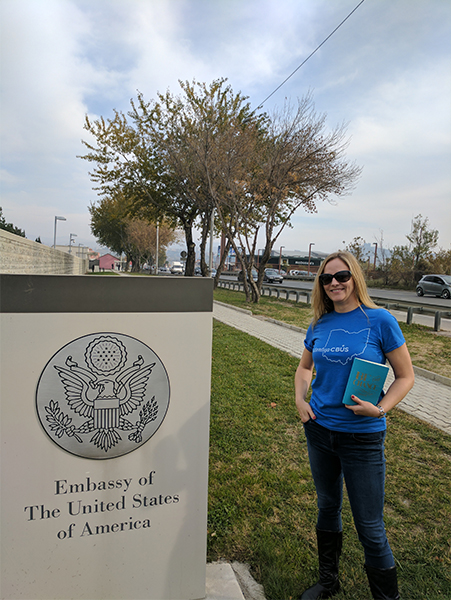The Backyard Effect Stretches Around the Globe
Entrepreneurship is all about building relationships, being surprised by the unexpected, and serendipity.
All three of those bells chimed for me recently when I was sponsored to present at a conference in Moscow, Russia to an audience of about 110 attendees.
These people came from across the Russian Federation and represented leading business incubation and acceleration programs. Attendees included academics, researchers, diplomats, and other entrepreneurial development professionals. The theme was how incubators build networks. The Russians didn’t call it the Backyard Effect, as we’ve coined it here, but that was the general idea.
Backyard Effect Around the Globe: Russian Students and Business People Want to Collaborate
This unexpected opportunity came about because I had previously presented at the National Business Incubation Association (rebranded today as InBIA). Part of our mission at Rev1 is to provide thought leadership based on our own experience and in so doing also benefit from the best practices of others. So, when the request came in, we said yes.
Three folks from the UK and I gave the keynotes and led a seminar, which included a panel with us and Russians from banks and VC funds there.
I spoke about how our incubator tenants have access to Rev1 investment funds, and the value proposition for startups, investors, and research institutions who have vested interests in commercializing their technologies, and in the case of OhioHealth, in attracting and retaining doctors and staff. The following day, I was business incubation expert Amanda Lennon’s deputy in a dialogue on what investors are looking for in a prospective portfolio company.
Participating in these conversations left me with a sense of hope and excitement. Like the Central Ohio story, the people in Russia had to build things from the ground up on their own.
Individuals are making a difference by collaborating in an ongoing benchmarking and research study on business incubation in Russia. They’re working on starting an association for business incubators. And, a couple of women spoke about investing in lifestyle start-up companies. They’re all taking the first and important steps in building the next generation of entrepreneurs who can launch successful, high-growth potential companies.
But the biggest unexpected event of this trip came about when a connection of mine from the Ohio University Innovation Center who had moved to Georgia (the nation, not the state) asked if I knew of anyone who would be willing to talk about the Rev1 model via a Skype interview as part of Global Entrepreneurship Week (GEW)—which just happened to line up with my trip to Russia.
From Russia, it is just a two-and-a-half-hour flight to Georgia. The US Embassy in Georgia sponsored my trip in connection with their initiatives to help support entrepreneurship.
There’s the serendipity!
Located at the crossroads of Western Asia and Eastern Europe, Georgia is very aligned on building an entrepreneurial ecosystem.
For those of you familiar with Startup Grind in Columbus, Georgia kicked-off GEW with a Startup Grind fireside chat with me. This conversation was the pre-party event. People were asked to purchase tickets and we had a crowd of around 75.
The Q&A from the audience was some of the best that I’ve heard at any Startup Grind event. Yet another surprise: this talk was featured on the national news showing the enthusiasm for this type of activity.
The following day, we met with the U.S. Embassy to talk about entrepreneurship. As one of the Georgia Prime Minister’s four key agenda points, entrepreneurship is a key initiative.
And the day after that we spoke with Georgia’s Innovation and Technology Agency (GITA) which is a national government agency similar to the Ohio Development Services Agency and the Third Frontier. We also met with representatives of Georgia’s banking and finance industry.
I went into this trip with zero expectations. I was prepared to talk about Rev1’s model and experience, and I very much wanted to learn.
Here are my take-aways.
In Georgia, the Prime Minister, national agencies, the banks, angel investors, and entrepreneurs are super aligned toward creating an ecosystem that fosters innovation and entrepreneurship.
Georgia is smaller than Ohio in population and size, but not by too much. There are a couple of cities and a lot of rural territory like us. They have built a beautiful incubator facility in Tbilisi with corporate sponsors. They have leveraged the country’s infrastructure of libraries to expand out into rural areas. They’ve also piloted several business pitch competitions, flying in Silicon Valley judges to participate. They all are interested in making entrepreneurship a priority.
They recognize that what they thought was important to do to accelerate entrepreneurship, might not be what they need to do first. That’s why they wanted to talk with us.
We talked about how important it is for an entrepreneur to validate the market before he or she builds a product. They listened when we talked about iterating and pivoting based on market and customer reaction. They also realized that venture acceleration services are key in helping entrepreneurs build great companies.
Probably because they are so aligned in mission, this group pulled together and ask me hard questions about how they could do things better.
Like the best entrepreneurs, they were coachable. They were thinking strategically, seriously considering how they could apply our model of the Backyard Effect. They don’t know exactly how they should be working together yet, but they are all aligned.
I left Georgia inspired and excited and eager to share with our team what is going on there. Rev1 is looking forward to continuing the conversation.


